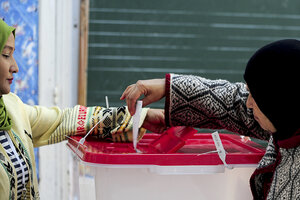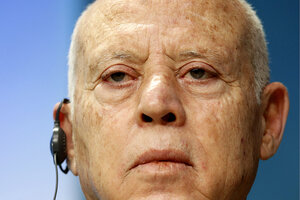Why populist president retains support amid Tunisia’s enduring poverty

A woman casts her ballot in elections for a new legislative chamber, in Tunis, Tunisia, Dec. 24, 2023. A record-low 11.6% of eligible voters participated in the elections, which the opposition characterized as an “overwhelming rejection” of President Kais Saied's program.
Hassene Dridi/AP
TUNIS, Tunisia
Kais Saied, the autocratic president who promised to succeed where Tunisia’s nascent democracy had failed, retains a hold on power and popular support even as the country enters a second year of record inflation, food shortages, and potential insolvency.
On the recent anniversary of the 2011 democratic revolution that Mr. Saied has all but snuffed out, several hundred members of the anti-coup National Front for Salvation and Islamist Ennahda protested in downtown Tunis, chanting, “We will sacrifice our life for liberty,” and “Stand together against populism and the return of dictatorship.”
Yet few Tunisians have heeded their call.
Why We Wrote This
Political analysts love to talk about voters’ pocketbooks. In theory, leaders would get credit for policy successes and blame for failures. But populists’ use of xenophobia and conspiracy theories can turn that idea on its head.
Many are swayed by Mr. Saied’s use of the time-tested populist playbook of xenophobia and conspiracy theories, allowing him to divert the anger of a population worn down by 13 years of rotating governments, rising inflation, and poverty.
Their support for – or lack of opposition to – Mr. Saied continues to feed on a brimming well of bitterness and distrust over the failures of post-revolution democrats.
“A majority of Tunisians see politicians from the time after the revolution as crooks, traitors, and terrorists, and whatever Saied does looks better than what went before,” says Youssef Cherif, director of Columbia Global Centers-Tunis.
“Which means people forget the economic problems under his rule, or they keep blaming those before him. They see the president as the only one who is trying to improve the country,” he says.
Political apathy is rife in Tunisia, which also works to Mr. Saied’s advantage.
Barely 20% of eligible Tunisians turned out to vote on Mr. Saied’s bespoke constitution, which turned Tunisia into a quasi-autocracy with a strong presidency. It was approved by 96% of those who cast ballots in the July 2022 vote.
Last month, a record-low 11.6% of Tunisian voters participated in local elections under Mr. Saied’s new political system; the opposition characterized that turnout as an “overwhelming rejection” of his political project.
Populism’s pull
The pull of Mr. Saied’s populism and anger over Tunisia’s post-revolution era can be felt most acutely in Minhala, a low-income Tunis neighborhood of cinderblock houses sagging on a hillside of government-owned land.
It is a bellwether district practically in the president’s backyard.
The residents are transplants from Tunisia’s marginalized hinterlands who have migrated here over the past decade to escape drought and poverty and look for jobs in the capital.
These were the same disenfranchised Tunisians who rose up and started the revolution in 2010 which ousted the former dictator, Zine el-Abidine Ben Ali and sparked the Arab Spring.
Which may be why Mr. Saied frequently uses this neighborhood as a campaign stop for photo-ops, making grand promises and railing against post-revolution “thieves.”
Nothing much has changed here since his highly publicized visit last July, when he promised paved roads, jobs, and decent housing.
The jagged road running up the hill and the side roads are still dirt; patches of pavement with leftover cement from construction speak to residents’ attempts to fix them themselves.
Most houses remain without electricity and running water.
Residents still have to walk down to a dirty, plastic-bottle-littered stream twice a day to fetch water in buckets and soda bottles for use at home. Promised cash and food never materialized.
The people’s patience
The president’s standing nevertheless appears largely secure.
“Kais Saied is someone who we can trust and is working against a corrupt system,” Ahmed, a Saied supporter, says as he tends to his fig grove above the hilly neighborhood. “Someone who stands with the people and is for the people deserves all our patience and time.”
Some weary residents, though, see Mr. Saied as another disappointment.
“The government and the state have let us down. They all lied, and Kais Saied is no different,” says Bouthaina, pointing to her barrel of green-tinted stream water. “They are working against the people and leaving us to rot.”
“We put our trust in Ennahda, then [the secular party] Nidaa, then Kais Saied, but the system continues to neglect us,” says Um Khalid, a Minhala resident who says she cannot afford chicken or vegetables, tears welling in her eyes. “What do we do now? Are we entirely alone?” she asks. “We vote and everything gets worse.”
Mr. Saied’s supporters are quick to remind Tunisians that the president has steered the nation through the pandemic, inflation, drought, and wheat shortages caused by Russia’s war on Ukraine.
“The president is facing unprecedented crises no Tunisian president has had to face,” says Mahmoud Ben Mubarak, secretary-general of the pro-Saied political group July 25. “All the while we are battling the deep state,” he adds, echoing Mr. Saied’s accusations that the Islamist party Ennahda is exacerbating food shortages and tanking the economy to “incite a revolt,” even though its leaders have been jailed.
The pro-democracy opposition’s voice barely registers.
“It is on us as the opposition to provide clear alternative economic and national policies,” says Nabil Hajji, secretary-general of Democratic Current, a party whose leadership has also been jailed. “We are failing to provide an alternative vision for Tunisians.”
“Hope” on the ballot in November
A glimmer of a hope for change could come in presidential elections next November, though Mr. Saied has banned international observers.
So far, his only challenger is Olfa Hamdi, a former CEO of Tunisia’s airline and founder of the secular democratic Third Republic Party.
In addition to vying to become Tunisia’s first female president, she is presenting an “alternative vision” to the xenophobic and autocratic Mr. Saied, running on a platform of “an inclusive and sustainable democracy” and “hope, prosperity, and unity.”
So far, many voters remain unconvinced.
“We need to give the president more time because he can’t reform what happened in 11 years in just two years,” says Basma Ben Jedian, a nurse from southern Tunisia, pledging her vote for Mr. Saied.
“Even if there is a new president, he or she will be like the others and nothing will change,” says Fraj Belkhiri, a 27-year-old sweets factory worker in Sfax. He views Mr. Saied as an “honest man” who has “stood alone against a corrupt system.”
“The president can only improve the situation,” he believes, “if he becomes a full dictator like Ben Ali.”
Ahmed Ellali contributed to this report.


